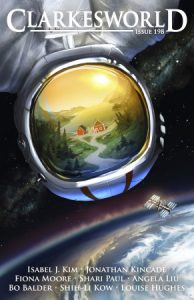Karen Burnham Reviews Short Fiction: Clarkesworld and The Sunday Morning Transport
 Clarkesworld 3/23
Clarkesworld 3/23
The Sunday Morning Transport 2/19/23, 3/5/23
A story in Clarkesworld that resonates nicely with the McAuley is ‘‘The Spoil Heap’’ by Fiona Moore. Morag is an older woman living in a post-collapse community, and happens to be particularly adept at finding useful items in the communal midden (‘‘spoil heap’’) and fixing them up. Including an old security robot. In flashbacks, we learn that she had been a local recruited into the security force for a wealthy American who had purchased an estate in town specifically to ride out the inevitable worldwide economic collapse. After two years of slowly dwindling self-sufficiency, the Big Man tries to coerce the town into accepting a feudal arrangement. The past comes back to haunt Morag when an old colleague comes by to try to enlist her help through blackmail (never a good strategy to begin with). Her actions are depicted with an effective dispassionate tone, which leaves a lot of room for the reader to reflect on the weight of her choices. Then in ‘‘Love in the Season of New Dance’’ by Bo Balder, Leena is a solo researcher on a planet where a sentient species has a cicada-like lifecycle and awakens and comes to the surface only every 79 years. She observes one male individual emerging early. She names him Blue, and they start talking. He’s obviously depressed that he will miss the culminating event of his life. She gets much deeper insight into their lifecycle and his perception of it – they have a three-gender system that requires the deaths of all three to nurture the next generation, but they’re still able to pass down a thriving culture. She comes to appreciate Blue as an individual, but how can she help a desperate soul from such a different species? This pairs very well with the story ‘‘Larva Pupa Imago’’ by Eric Schwitzgebel in the previous issue.
Two stories involve strange cases of symbiosis. ‘‘Zeta-Epsilon’’ by Isabel J. Kim tells of Zed, who grew up more or less as an experimental subject when his parents implant a connection to a ship-controlling AI into his brain as a baby. He grows up thinking of Ep as the sister he talks to inside his head. Told in interspersing sections, we also learn that later in life, midway through a completely successful career as Epsilon’s pilot, he appears to throw himself out an airlock. That’s the mystery that’s slowly revealed between the flashbacks and current time narrative. It’s a strange plot and a lovely story. ‘‘Love is a Process of Unbecoming’’ by Jonathan Kincade features a much less positive relationship in a story told from the perspective of a sentient bacteriophage that has infected a senior member of a biotech firm. It finds just about everything about him and his life repulsive and we get scenes from his life described in its loathsome terms, especially as he starts hallucinating scenes from his daughter’s sickbed and his failing marriage.
In February The Sunday Morning Transport has a beautiful story from Rachel Hartman, ‘‘Ghost Story’’. It is narrated by a Corna, a sage of his people, who elected to stay in the mortal realm as a ghost to help guide them. Unfortunately, the Saints came, convinced most people that ghosts don’t exist, and built up the city over his tomb. He’s been surviving by stealing bits of life essence from rats and roaches. When a youth stumbles into his catacomb, he instinctively takes a bit of his essence as well, which causes the boy to relieve his most immediate trauma – losing his family to the dragons that are attacking the city above. The boy understands that he can see ghosts, and he’s determined to learn something from the Sage – a process that isn’t easy for either of them. Finally, the first story I reviewed from TSMT was by Karen Lord (full disclosure, a good friend and collaborator), so it’s fitting that another of her stories will be my last. ‘‘A Timely Horizon’’ is a lovely story of Alina, in a world where each person is given a seed tailored to them when they turn about thirty years old. They can choose when to plant the seed. The trees and forests that grow from them form a communal network and store of knowledge, memory, history – and also access to the multiverse where you can learn about the different ways your life might have ended up. Alina waits until she is towards the end of her life to consult her tree, and she learns about both the good and the bad that she avoided in this one. It in no way leaves her despondent, but instead feeling more connected to herself, her life, and her community.
With that it’s with regret tinged with relief that I let you know that this is my last column as an official short fiction reviewer for Locus. I’ve been honored to write these reviews for almost five years, but positive events in my life, particularly a promotion at my day job and elevation in my professional society, have left me with much less spare time than I used to have. Reading 40 to 50 short stories and writing 2,000 to 3,000 words about 20 to 25 of them each month takes a big chunk of time! It’s been amazing to be able to explore so many venues and read authors in every stage of their careers, from just starting out to looking back over many successful years. I hope that for some emerging authors my small words of acknowledgement and praise encouraged them to keep going – it can be hard to feel like anyone is paying attention when you’re starting out in short fiction.
Let me also give you a super quick overview of some of the venues I want to commend to your attention (apologies if I miss anyones’ favorites; these are ones that have been on my radar in the last couple of years). Of course there are the stalwarts like Analog and Asimov’s that know their audience and cater to them quite successfully. Although there are plenty of names that appear in their pages dozens of times, they also publish a surprising number of new authors. Then there are the heavy hitters of the internet age, places like Strange Horizons, Clarkesworld, Tor.com, Beneath Ceaseless Skies, FIYAH, and Uncanny. They each bear the distinctive imprint of their editorial teams, and I love both the stories they publish and how each has produced an incredibly diverse array of stories while establishing unique identities. All these venues are likely well known to the readers of this column, either from our reviews or from awards lists. Let me also commend to your attention some of the less well-known zines.
Omenana brings us fiction from Africa and across the diaspora, an incredibly useful service. khōréō focuses on the immigrant experience with many moving tales. Mithila Review is likewise dedicated to bringing us fiction from around the world. Luna Station Quarterly focuses on women-identifying authors, and recent entrant New Edge brings us LGBTQ-friendly sword & sorcery stories. Metaphorosis and Abyss & Apex have been flying under the radar, publishing solid and sometimes exceptional work for years, month in and quarter out. Whereas at just over a year old, The Sunday Morning Transport is already going strong and showing up on awards lists. One of my favorite newcomers is Solarpunk, also in its second year. While the ‘‘punk’’ suffix is sometimes overused, given the general state of our world and especially how that world is depicted in contemporary media, believing that there’s any hope at all in the years to come can feel like a truly rebellious and ‘‘punk’’ stance. Their hopepunk stories are optimistic without being naive, and feature a more communal and accepting spirit than we see in a lot of historical SF.
One I wish I could recommend is Future Science Fiction Digest. Like my tenure as a Locus short fiction columnist, editor Alex Shvartsman started that magazine in 2018 with a view to bring more international and translated fiction to our attention. Also much like my tenure here, he had to put it on hiatus a few months ago, citing the inability to juggle those editorial duties with his day job, translation work, and own creative writing efforts. We all enjoy short fiction, but almost no one can make a living doing it – and as Neil Clarke’s editorial in the most recent Clarkesworld reveals, a new change to Amazon’s subscription policies is about to make it even harder for almost everyone. To everyone who has ever enjoyed this column or any of the short fiction you find online or in the magazines, please support them monetarily to whatever extent you can. Without readers willing to pay, the writers, editors, and publishers ultimately won’t be able to keep bringing us the fiction we love and crave.
Thanks to everyone who has read this column, thanks to my fellow reviewers, to Jonathan Strahan, and all the Locus staff for the opportunity to do this for five years! It’s been an honor, and I hope to see you in the Divers Hands section from time to time.
Recommended Stories
‘‘Love in the Season of New Dance’’, Bo Balder (Clarkesworld 3/23)
‘‘Ghost Story’’, Rachel Hartman (The Sunday Morning Transport 2/19/23)
‘‘A Timely Horizon’’, Karen Lord (The Sunday Morning Transport 3/5/23)
‘‘The Spoil Heap’’, Fiona Moore (Clarkesworld 3/23)
Karen Burnham is an electromagnetics engineer by way of vocation, and a book reviewer/critic by way of avocation. She has worked on NASA projects including the Dream Chaser spacecraft and currently works in the automotive industry in Michigan. She has reviewed for venues such as Locus Magazine, NYRSF, Strange Horizons, SFSignal.com, and Cascadia Subduction Zone. She has produced podcasts for Locusmag.com and SFSignal.com, especially SF Crossing the Gulf with Karen Lord. Her book on Greg Egan came out from University of Illinois Press in 2014, and she has twice been nominated in the Best Non-Fiction category of the British SF Awards.
This review and more like it in the May 2023 issue of Locus.
 While you are here, please take a moment to support Locus with a one-time or recurring donation. We rely on reader donations to keep the magazine and site going, and would like to keep the site paywall free, but WE NEED YOUR FINANCIAL SUPPORT to continue quality coverage of the science fiction and fantasy field.
While you are here, please take a moment to support Locus with a one-time or recurring donation. We rely on reader donations to keep the magazine and site going, and would like to keep the site paywall free, but WE NEED YOUR FINANCIAL SUPPORT to continue quality coverage of the science fiction and fantasy field.
©Locus Magazine. Copyrighted material may not be republished without permission of LSFF.







